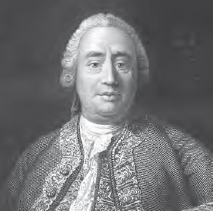The Enlightenment PeriodDavid Hume |
What are some details of David Hume’s life and career? |
Hume was born in Edinburgh in 1711. His father was a distant relative of the Earl of Home, and his mother’s close relatives were lawyers. David was expected to study law, but he didn’t like it and left Edinburgh University when he was 15 to read and think about philosophy. He subjected himself to years of intense study, and in 1734 was under a doctor’s care for ailments of body and spirit. This was followed by a philosophical breakthrough, as well as work for a merchant in Bristol. He then spent three years at La Fléche, René Descartes’ (1596–1650) old school. Hume anonymously published A Treatise of Human Nature in 1739. This work was ignored by other intellectuals, and Hume himself later described it as having fallen “stillborn from the press.”
In hopes of greater recognition (Hume was consumed by what he called “love of literary fame”) he composed An Abstract of a Treatise of Human Nature, which was anonymously published in 1740. His next major philosophical work was Philosophical Essays concerning the Human Understanding (1748), which was retitled An Enquiry Concerning the Human Understanding (1758). Then came An Enquiry Concerning the Principles of Morals (1751). The Enquiry was more explicitly anti-religious than the Treatise. His Dialogues Concerning Natural Religion was probably written during the 1750s, although published posthumously.
With his philosophical research complete, Hume applied himself to history (his History of Great Britain won him great fame and acclaim), economics, ethics, and political philosophy. However, he also tried, although without success, to secure the position of chair of philosophy at the universities of Edinburgh and Glasgow. He was appointed secretary to General St. Clair for three years in 1746, which led him to Brittany and Turin; and he was in charge of the Advocates Library in Edinburgh for five years, beginning in 1752. He was then private secretary to the British ambassador in Paris and undersecretary of state.

